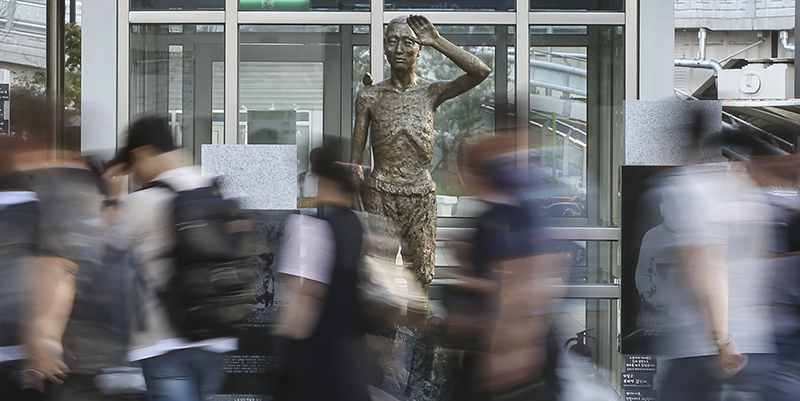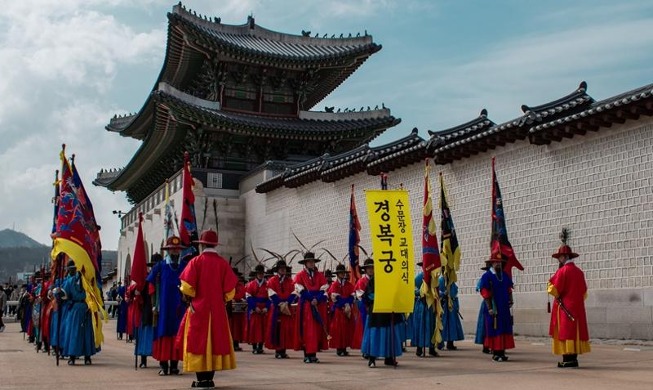-
 Korea.net's 24-hour YouTube channel
Korea.net's 24-hour YouTube channel- NEWS FOCUS
- ABOUT KOREA
- EVENTS
- RESOURCES
- GOVERNMENT
- ABOUT US

A statue of a forced Korean laborer from the Japanese colonial era is displayed at Yongsan Station in Seoul. (Korea.net DB)
By Korea.net Honorary Reporter Bojan Stojkovski from Macedonia
As the world follows the developments in Japan’s export curbs on Korea, is waging a trade war becoming the new reality for resolving historical disputes between countries?
The spat between Korea and Japan started after the Korean Supreme Court last year ordered Japanese companies that used forced Korean laborers during Japan's colonial rule of the Korean Peninsula (1910-45) to compensate the victims. This month, Tokyo further escalated tensions by restricting Japanese exports of crucial materials needed for the production of consumer electronics and smartphones to Korea.
Tokyo defended its actions by blaming Seoul for mishandling such materials and that some of them ended up in North Korea. South Korean authorities have denied the allegations, saying the country has strictly enforced trade restrictions on its northern neighbor.
The dispute threatens to incur more severe consequences that just stirring up tensions between the sides, with a global price hike for semiconductor chips looming. Even U.S. President Donald Trump has offered to mediate as a means to resolve the matter diplomatically.
Seoul and Tokyo are firmly entrenched in their positions, and thus the trade dispute could spread to other areas of cooperation between them. Because both countries are G-20 member economies, the repercussions of their row can prove vast and damaging, especially when global technology is involved.
When it comes to the core of the issue, however, can a trade war of this magnitude solve a highly complicated problem like the use of forced laborers during Japanese colonial rule of Korea? For comparison, I cite the example of my own country, North Macedonia, and its problematic relations in the past with its southern neighbor Greece.
Both sides were entangled into a bitter historical dispute over North Macedonia’s name (then called the Republic of Macedonia), for almost three decades before it was finally resolved this year. One of the many escalations in the naming dispute occurred in 1994, when Greece imposed a trade embargo on my country. The blockade lasted for 18 months and resulted in economic losses of about USD 2 billion for my homeland.
About 25 years ago, the export curbs Greece placed on North Macedonia did nothing to help resolve the historical dispute between the two countries. Instead, lots of time, political maturity and diplomatic efforts were required to reach a compromise acceptable for both sides.
While the situation between Seoul and Tokyo differs, the notion of a trade dispute being caused by a spat over history means both cases have similarities. Both Japan and South Korea need courage to openly face the reality that caused this trade war. The Balkans and Northeast Asia have had similar experiences in the past, with both regions suffering many destructive wars and colonization attempts.
Resolving bilateral disputes has always been hard for countries that cannot agree on history. Because Japan and South Korea are developed economies, however, both must be aware that further escalating and prolonging their dispute will make the rest of the world suffer, too. The two sides have a far bigger responsibility to the global community than most countries, and thus must resolve their row as soon as possible.
wisdom117@korea.kr
*This article is written by a Korea.net Honorary Reporter. This group has members from all around the world who share with Korea.net their love and passion for all things Korean.













